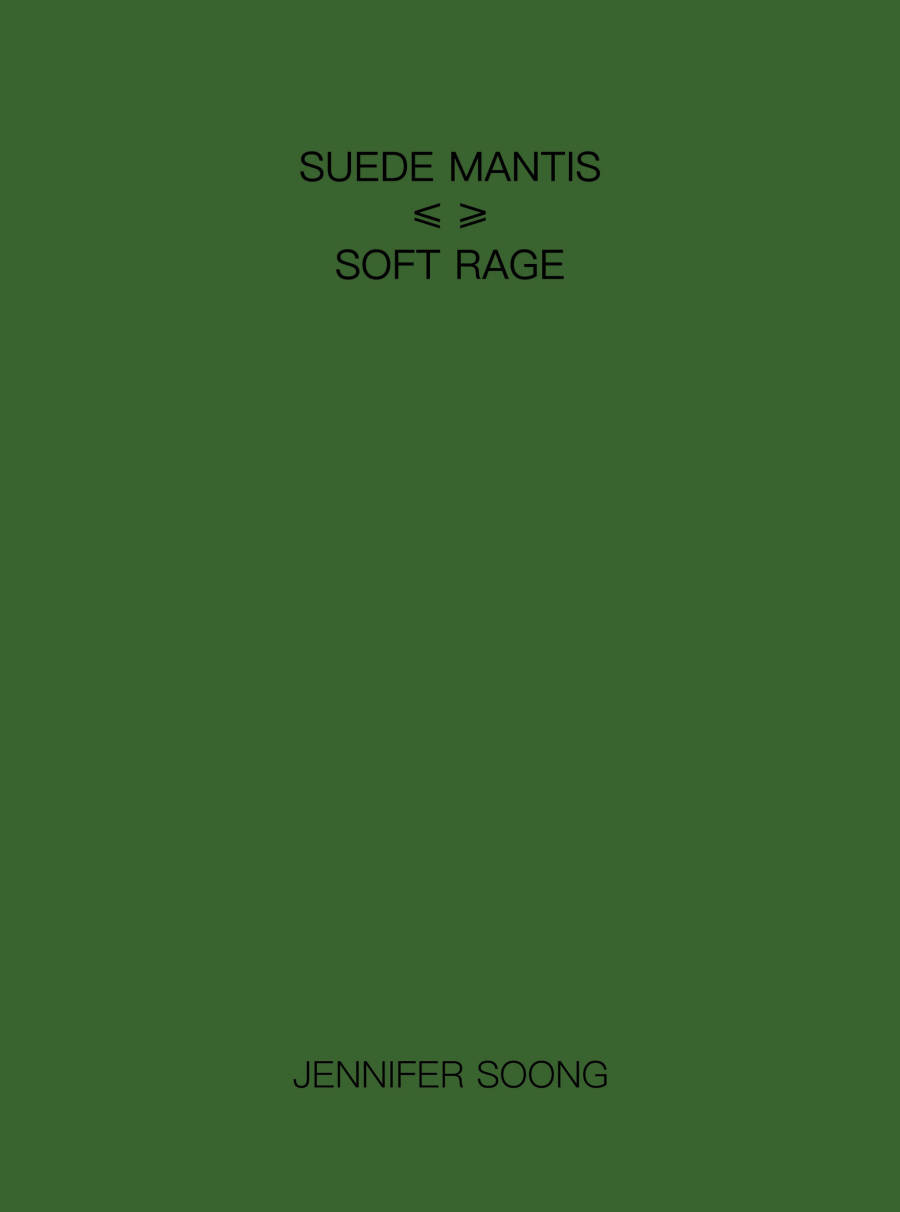Jennifer Soong
Jennifer Soong

Suede Mantis / Soft Rage
Swaying between command and curiosity, acquiescence and destruction, distance and proximity, Jennifer Soong’s Suede Mantis / Soft Rage proffers tenderness that teeters on the precipice of loss. Premised on this peril is not a paralyzing grief but a generative poiesis of “cruel desperation,” in which poetry pronounces itself in contrasts and conditionals, had beens and renunciations. Like a tongue that tans flesh, like passion that’s made pliable by the pulsing and glistening of language, Suede Mantis / Soft Rage is the negotiated labor of a process rather than a product, raising interior operations to the surface while presenting an antithesis to mimetic construction. Neo-romantic and post-pastoral, the poems in Soong’s second collection reinvigorate lyric possibility.

My Earliest Person
Lyrical drifts warped by syntax into blizzarding softness; odes to beauty, meaning, and inexperience splintered by history and grammar. An aqueous surface marbled with the lightest possible touch, lost footings arrested by change’s near-griplessness.
None of this matters. It’s only supposed
to save you from yourself. None of this
matters, when I try to take it out of me into
the world, which to find I can praise
I go out to
Composed across two winters between late 2022 and early 2024. Contains 43 poems.
“This luscious and needle sharp collection is a real feat of the textual imagination, wow.” —Adam Piette, Blackbox Manifold, no. 34

Slips of the Mind: Poetry as Forgetting
An audacious account of what happens when forgetting becomes a way of writing and writing becomes a way of forgetting.
In Slips of the Mind, poet and critic Jennifer Soong turns away from forgetting’s long-standing associations with suppression, privation, and error to argue that the absence or failure of memory has often functioned as a generative creative principle. Exploring forgetting not as the mere rejection of a literary past or a form of negative poetics, Soong puts to the test its very aesthetic meaning. What new structures, forms of desires, styles, and long and short feelings do lapses in time allow? What is oblivion’s relationship to composition? And how does the twentieth-century poet come to figure as the quintessential embodiment of such questions?
Soong uncovers forgetting’s influence on Gertrude Stein, Lyn Hejinian, Tan Lin, Harryette Mullen, Lissa Wolsak, and New York School poets John Ashbery, James Schuyler, Bernadette Mayer, and Ted Berrigan, among others. She reveals that forgetting’s shapeshifting produces differences in poetic genre, interest, and degrees of intentionality—and that such malleability is part of forgetting’s nature. Most provocatively, Soong shows how losing track of things, leaving them behind, or finding them already gone resists overdetermination and causality in the name of surprise, as poets leverage forgetting in order to replace identity with style. Slips of the Mind is the kind of literary criticism that will reward all readers of modern and contemporary poetry.

Comeback Death
Comeback Death, Jennifer Soong's third book, weaves its registers of what Soong names as "dread, gender, sarcasm, sublimation of pain, fruit, ambition, and fecundity" through an English which is not only polyvocal but uncannily porous. Its languages (English, Russian, German, ancient Greek) underscore a perverse pastoral range that somehow bridges Oxford, New Jersey, and Lesbos. With a ferocity both musical and analytic, Soong's third book offers an unprecedented set of tonalities for immense architectures of feeling.
"In Comeback Death, Jennifer Soong dramatizes one of the key problems of our time, and indeed any time, which is how to reorganize the (negative) affects structuring intersubjectivity and thus conditioning our capacity to act in a common interest among others."—Thom Donovan

Near, At
Near, At follows the inherent strangeness of one’s consciousness as it observes and comes into contact with the physical world. A sustained exploration of language, capitalism, gender, and nature, Near, At traverses and measures the movement of silence against the movement of thought and its pauses. Divided into five parts, each with its own form, and followed by a series of ongoing love poems called MY CHRISTOPHER POEMS, this debut collection is slow to assume but quick to adjust. Rooted in both the traditional and the experimental, it asks just how little of ourselves we can be.
"Jennifer Soong’s collection displays her nuanced understanding of how the philosophical-treatise-as-poem can birth an emotional and embodied intelligence, placing her in a line of affinity with contemporary writers such as Lyn Hejinian, Lisa Robertson and Anne Boyer. Simultaneously, Soong accomplishes something utterly unexpected in 2019: she casts a harpoon into the New England landscape poem – long linked to the genteel, the male, the WASP – and brings it vibrant and expansive into the twenty-first century. Certain poetry collections are written to be 'of the moment,' but a collection such as Near, At is written to give pace to those moments, with each carefully placed word a further step taken by the poet and reader together. Come near, these poems tell us, and we feel we’ll arrive at exactly the time and place we need to be."
—Mia You